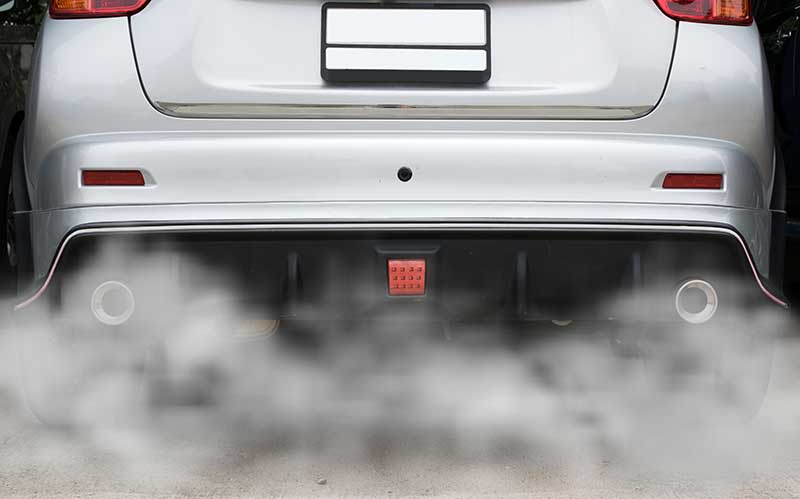
President Trump is rolling back clean car standards that protect our air and our health. Photo: ©Orlando Stocker via Shutterstock
On Wednesday, President Trump took the first step toward rolling back emissions standards for new cars and trucks in model years 2022–2025. These important federal standards set fuel economy (miles per gallon, or “MPG”) requirements that save you money at the pump and reduce our dependence on foreign oil. They also reduce dangerous climate emissions and other harmful air pollutants.
We need to be trucking forward – not reversing
Now is not the time to put the brakes on fuel efficiency standards. We need to rev up our commitment to clean cars with even more aggressive investments in electric and other emission-free vehicles. Here in the northeast, our cars, trucks, and other vehicles are the single largest source of climate-warming emissions. The current fuel efficiency standards are projected to reduce 6 billion tons of greenhouse gases between 2012 and 2025. There is simply no way to meet our states’ ambitious climate mandates without cleaner, greener cars.
Strong fuel efficiency standards are critical to protecting public health, too. A more fuel-efficient car spews fewer dirty air pollutants into our communities – meaning fewer deaths, emergency room visits, lost workdays, and healthcare costs.
Rolling back fuel efficiency standards would be a wrong turn for the economy
More fuel-efficient vehicles will save the average family thousands of dollars. What’s more, calling the fuel efficiency standards into doubt is bad for business. As Massachusetts Senator Ed Markey emphasized in a recent statement, a rollback will “create needless uncertainty for the auto industry, threatening the economic and employment gains automakers have made in recent years.” Don’t just take Senator Markey’s word for it; a recent survey shows that 70% of auto parts suppliers do not want the standards to change.
On top of all this, taxpayers should be outraged that the President is letting automakers off the hook for their end of the bailout bargain. Automakers agreed to the fuel efficiency standards back in 2009–2010 – together with the taxpayer bailout of major automakers. The auto industry had been caught off guard by high gasoline prices, which drove consumers away from U.S.-made gas-guzzlers. The big automakers supported the fuel efficiency standards back then, and accepted billions of taxpayer dollars for research into more fuel-efficient technologies and EVs.
We cannot afford to let other countries leave us in the dust now. Innovation drives our country forward, and environmental regulations have long driven innovation in the auto industry – including the catalytic converter, unleaded gasoline, and numerous other advancements. Extensive scientific and market analysis – including considerable input from the auto industry—demonstrates that automakers can achieve the fuel efficiency standards at reasonable cost and with existing technologies.
A sign of bigger battles to come?
The Trump Administration’s decision to reconsider national fuel efficiency standards foreshadows bigger battles ahead for New England. There is reason to believe that this is just a first step; after rolling back national standards, President Trump may hit the gas and gun it for the more stringent clean car standards adopted by many New England states.
Most New England states have clean car standards that require automakers to go above and beyond the national standards. Federal law allows California to adopt more stringent standards and permits other states to follow California’s program. Connecticut, Maine, Massachusetts, Rhode Island, and Vermont have all adopted California’s more ambitious clean car standards – as have other Northeast states such as New York and New Jersey. Altogether, California’s program covers roughly 35% of the U.S. population. The standards include critical pollution limits as well as requirements for automakers to sell an increasing number of electric vehicles in our states.
New England states can go above and beyond federal standards only if EPA grants California permission – known as a “waiver.” But California’s special authority to enforce clean car standards may now be in jeopardy. EPA Administrator Pruitt has signaled that the state’s waiver is headed for the exit ramp.
CLF is geared up to defend states’ rights to protect our air quality
If President Trump and Administrator Pruitt threaten California’s waiver – and the New England states’ clean car standards – CLF will be standing with states to defend New England’s environmental leadership. Revoking the waiver would be unprecedented. Federal law has always respected the right of states to adopt their own air protections. With a climate science denier leading the EPA, state authority has never been more important.
CLF advocates have started our engines, and we are ready to fight to defend New England states’ rights to reduce car pollution and achieve our climate goals.



